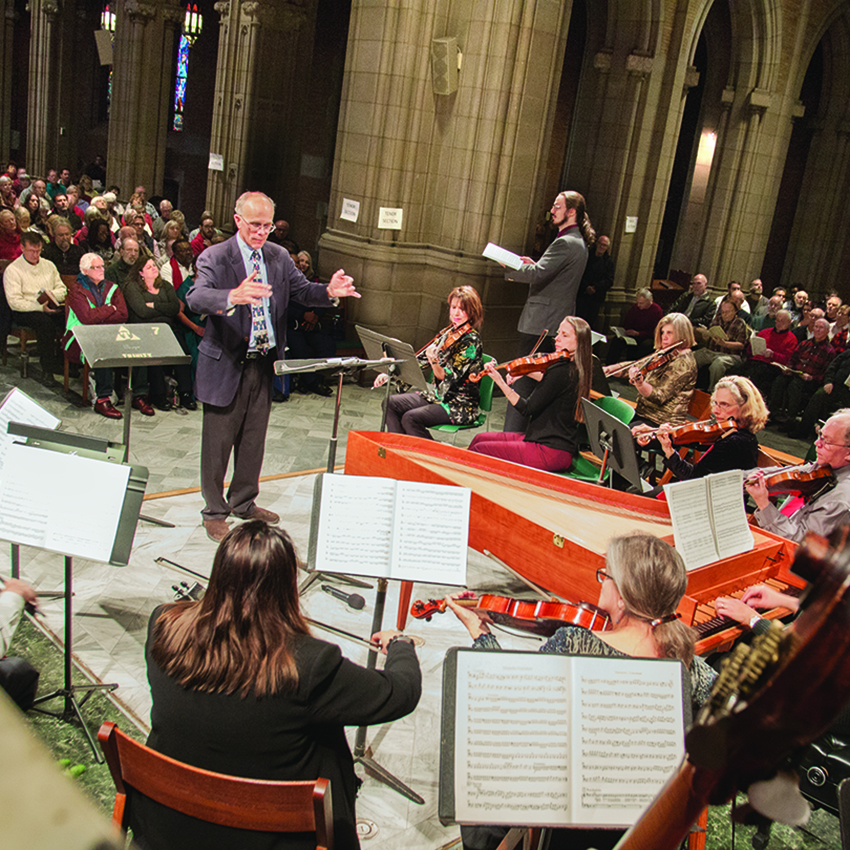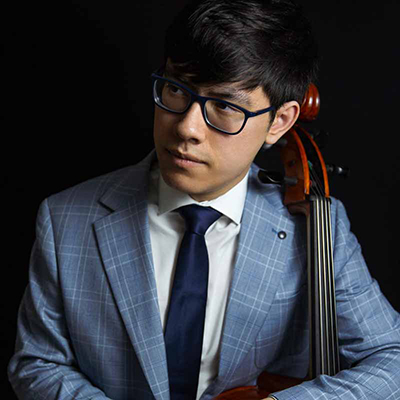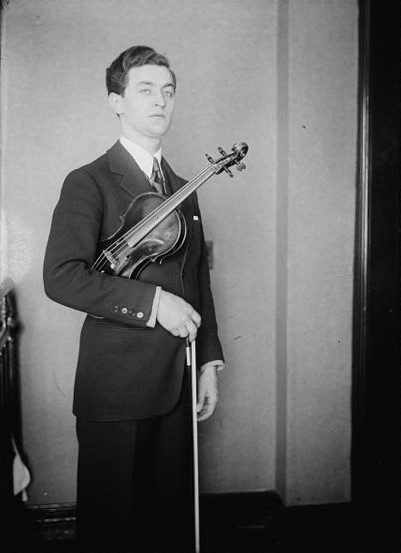by Jarrett Hoffman

•Today: Trinity’s “Messiah Sing” at noon, and The Cleveland Orchestra’s first holiday concert of the season
•Interesting reads: the history of Cleveland Orchestra holiday concerts, and cellist Zlatomir Fung’s new audio play The Elves and the Cello Maker
•Announcements: Detroit Symphony extends contract for Music Director Jader Bignamini, and Greater Cleveland Music Census extends its deadline
•Almanac: violinist Samuel Dushkin, his collaborations with Stravinsky, and a work he did not premiere — and not by his own choosing
HAPPENING TODAY:
Head to Trinity Cathedral at noon to be part of the “Messiah Sing,” the final concert of the fall series. The Trinity Chamber Orchestra, soloists, and conductor Todd Wilson will present selections from Handel’s beloved oratorio with the audience as the chorus. A limited number of scores will be available on loan, but audience members are asked to bring one along if they have one at home. A freewill offering will be taken up. Note that the concert will also be livestreamed.
And The Cleveland Orchestra will kick off its run of holiday concerts at 7:30 pm at Severance. Brett Mitchell conducts, and vocalist Carpathia Jenkins is the soloist. Tickets are available here.
INTERESTING READS:
Speaking of which — The Cleveland Orchestra’s first dip into Christmas music came early on in the ensemble’s history (around its first birthday, in December 1919). But did you know that their first official X-mas program did not take place until 1940? That’s just one interesting factoid from an article by Krista Mitchell delving into the history of Cleveland Orchestra holiday concerts. Read here from the Orchestra’s archives.

“Based on the Grimm Brothers’ fairy tale The Elves and the Shoemaker, Fung’s play tells the story of a New York City cello maker (WQXR host Jeff Spurgeon), his cello playing daughter, June (operatic mezzo Briana Hunter), and a mischievous elf named Q (drag performance artist and violinist Thorgy Thor) who saves Christmas for both of them through the power of music,” WQXR reports. “Carter Brey, principal cellist of the NY Philharmonic, makes a cameo appearance as himself, and Fung joins the cast as the Uber driver.”
ANNOUNCEMENTS:
The Detroit Symphony has given Music Director Jader Bignamini a five-year extension to his contract, which will now run through the 2030-31 season. Read more from The Violin Channel.
The deadline to participate in the Greater Cleveland Music Census has been extended to Friday, December 15, as Cleveland.com reports.
TODAY’S ALMANAC:

That began with the premiere of Stravinsky’s Violin Concerto — the composer’s first work for violin — and continued with several works for violin and piano. The Duo Concertante and Divertimento were both written by Stravinsky to play with Dushkin on tour, while the Suite Italienne — a transcription from the composer’s ballet Pulcinella — was made in collaboration with the violinist.
Click here to listen to a 1935 recording of the Concerto as performed by Dushkin and the Lamoureux Orchestra, led by Stravinsky himself.
Dushkin is also known to history for his involvement in a work he did not premiere — and not by his own choosing. That would be William Schuman’s Violin Concerto, which the violinist commissioned with the idea of premiering it with Serge Koussevitzky and the Boston Symphony. Only, at this point in Dushkin’s career, it seems that his playing had seen better days, something that Schuman discovered after meeting with Dushkin in late 1947 to hear him play. By that point, the concerto was already written.
“I will play, but not with Dushkin,” Koussevitzky would go on to tell Schuman — adding that it would be on the composer, of course, to pass this information along. “I don’t care what your agreement is.” (Dushkin had exclusive rights to the concerto for three years.) “Take it away from him. We’ll give it to Isaac Stern and play it with the Boston Symphony.”
After attending a concert together, Schuman and Dushkin sat down for drinks. As the composer later related in an interview, he broke the news like this:
Listen, Sam, this is the most difficult moment of my life in personal relationships, and it will be for you, too, but I can’t go on with the Violin Concerto. I know you were a great performer at one time, but no one is going to play it [with you], and this is what I have to tell you.
In response, Dushkin broke his cocktail glass in two.
The experience was, in the eyes of Schuman,
Just terrible…it was one of the saddest things in my life. I still don’t know whether I was right or wrong.
(They do seem to have eventually put the past behind them after the death of Schuman’s parents.)
The three years of exclusivity passed, and in 1950, with Koussevitzky having stepped down at the BSO, Isaac Stern premiered the Concerto with the orchestra and new music director Charles Munch. Listen to that performance here.
What can only have added to Schuman’s angst over the whole situation is that he wasn’t entirely pleased with Stern’s interpretation — or with the piece itself. He went on to revise it twice, the final version being premiered in 1959 at Aspen Music Festival with violinist Roman Totenberg and conductor Izler Solomon. Finally, he was satisfied.
Also born on this date in history was pianist and composer Victor Babin, who spent about a decade as director of the Cleveland Institute of Music. Read an almanac entry about him and his duo-partner-turned-life-partner Vitya Vronsky here.



